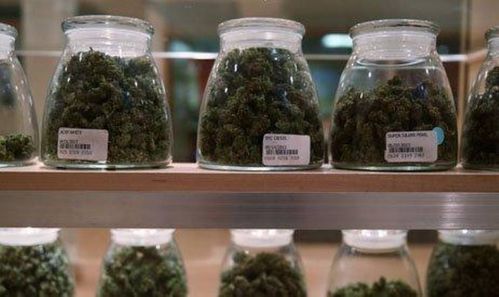
For budding entrepreneurs in a crowded field, name recognition is big. Cannabiz Gurus, Cannabonix and Cannabilutions get style points. Medical Marijuana Inc., Medical Marijuana Centers of Florida and Medical Marijuana Dispensaries of Florida do not. Cafes, boutiques, legal teams, security, beverages. “Everyone wants to get into this business,” said Steven Cooksey, a medical marijuana business specialist.
There are roughly 200 businesses registered in Florida using a combo of marijuana, medical marijuana, cannabis, medical cannabis, and old-school slang, according to a Daily Fray snapshot at the state Division of Corporations. Specialties include legal services (Medical Marijuana Law Group), security (Medical Marijuana Security of Florida), sales (Medical Marijuana Store) and accessories (Medical Marijuana Shoppes), hangouts (Cannabis Café), and liquid enjoyment (Cannabis Beverage Development). The schools include the Medical Marijuana Institute of Technology in Winter Park. Formed in September, MMIT is open for business, grooming Floridians for the arrival of legal medical marijuana with marked-down prices on a spectrum of subjects, including classes in aerial drones and crypto currency, according to its website.

 » Steven Cooksey: "This is, at its core, a business. Just like any other startup, your business will cost you a lot of time and money, and has a high chance of failure. Marijuana does not sell itself, despite what anyone may tell you."
» Steven Cooksey: "This is, at its core, a business. Just like any other startup, your business will cost you a lot of time and money, and has a high chance of failure. Marijuana does not sell itself, despite what anyone may tell you."
"As soon as word starts spreading that opening up in the marijuana business is a possibility, you see a huge flurry of activity," said Cooksey, licensing director for MedMen, a flourishing medical marijuana consulting and marketing firm based in Los Angeles.
MedMen plans and executes medical marijuana business strategies for clients in several states. The firm, founded in 2007, has helped more than 100 dispensaries and growers get off the ground, and last year raised $3.75 million in venture capital, according to Forbes. (In Florida, MedMen’s backers include N Squared Management, a Miami-based investment fund.)
Cooksey, a former grant writer for the City of Houston and once an instructor in finance, marketing and government relations at Texas A&M, shuttles between Nevada and Illinois, where MedMen is shepherding roughly two dozen clients. He answered a few questions by email for The Daily Fray:
 At last count there are roughly 200 potential medical pot businesses registered with Florida’s Division of Corporations. Most organized in late 2013 through 2014 – in the heady days before Amendment 2 to legalize medical marijuana was narrowly defeated. In your experience in California and other states, is that kind of entrepreneurial stampede normal?
At last count there are roughly 200 potential medical pot businesses registered with Florida’s Division of Corporations. Most organized in late 2013 through 2014 – in the heady days before Amendment 2 to legalize medical marijuana was narrowly defeated. In your experience in California and other states, is that kind of entrepreneurial stampede normal?
Yes. As soon as word starts spreading that opening up in the marijuana business is a possibility, you see a huge flurry of activity. Everyone wants to get into this business. Reality sets in, though, and it can take years for these programs to get off the ground and actually start licensing people. Most of these initial groups drop off and there is a long lull in activity. Once states finalize regulations, and application windows are announced, you'll see another flurry of activity. In our experience, the ones who win are the ones who got there early, stuck it out, and had all of their ducks in a row when it came time to apply.
Charlotte's Web, the non-euphoric strain that helps patients with neurological disorders such as epilepsy, was legalized in Florida in 2014. It appears dead at the regulatory level, stalled by lawsuits that allege a rigged game. The latest round of lawsuits prompted a lawmaker to suggest “snake oil salesmen” were getting into the act. Without commenting on the merits of the lawsuit, in your experience -- especially in states in the early stages of legalization – is the "snake oil salesman" a legitimate worry?

 First, let me say that marijuana is not "snake oil." It has real benefits. However, snake oil salesmen are absolutely a legitimate concern. One of the hardest parts of legitimizing the marijuana industry is the dearth of marijuana knowledge among most of those in the U.S. Because of prohibition, people have only been told that marijuana is a bad thing to do. People aren't taught the benefits. There are scammers out there who take advantage of this with lies. Once these lies are discovered, it casts a shadow on the entire industry. Those of us who are legitimate must work together to root out these scammers and educate the public to the realities of marijuana.
First, let me say that marijuana is not "snake oil." It has real benefits. However, snake oil salesmen are absolutely a legitimate concern. One of the hardest parts of legitimizing the marijuana industry is the dearth of marijuana knowledge among most of those in the U.S. Because of prohibition, people have only been told that marijuana is a bad thing to do. People aren't taught the benefits. There are scammers out there who take advantage of this with lies. Once these lies are discovered, it casts a shadow on the entire industry. Those of us who are legitimate must work together to root out these scammers and educate the public to the realities of marijuana.
What is your first piece of advice for entrepreneurs who are considering the medical marijuana business?
Remember that this is, at its core, a business. Just like any other startup, your business will cost you a lot of time and money, and has a high chance of failure. Marijuana does not sell itself, despite what anyone may tell you. If you don't get into this with that mind-frame, you guarantee that you will not last long in this space, and you will lose a lot of money.
 There are several services and websites that offer to teach people how to grow and cultivate marijuana. Probably a lot of people, me included, can grow a pot plant with a seed and some soil. How is someone taught to grow medical marijuana and what would be the startup costs?
There are several services and websites that offer to teach people how to grow and cultivate marijuana. Probably a lot of people, me included, can grow a pot plant with a seed and some soil. How is someone taught to grow medical marijuana and what would be the startup costs?
What those websites don’t tell you is that they only have experience growing [marijuana illegally] in closets and in garages. That type of grow is not really translatable to the commercial grows you will see in legitimate marijuana markets. You cannot do this by yourself, and you cannot learn online. If you do not have experience growing commercially and you do not hire someone who does, you will not succeed.
California was the first state to establish a medical marijuana program through Prop 215 in 1996 and a Senate bill in 2003. Almost two decades later, how is the medical marijuana industry doing in the Golden State?
The business of marijuana in California is going very well. A lot of people are making a lot of money. Regulation, on the other hand, is a disaster. The market is barely regulated, if regulated at all. Cities try to control what goes on within their borders, but even that isn't really working. It's the Wild West out here, which leaves all California marijuana businesses susceptible to federal intervention, because the easing of federal enforcement relies on well-regulated state programs. It is almost inevitable that recreational marijuana will be legalized in California in 2016, and hopefully that leads to strict but sensible regulation.
 5=Q&A is a feature that appears periodically in The Daily Fray, spotlighting people, issues, places and things. Comments: Editor@TheDailyFray.com.
5=Q&A is a feature that appears periodically in The Daily Fray, spotlighting people, issues, places and things. Comments: Editor@TheDailyFray.com.
Outside
Bitcoin mining emissions in China will hit 130 million tonnes by 2024 https://t.co/w6He7so8N2 pic.twitter.com/qYUDtBdeRK
— New Scientist (@newscientist) April 9, 2021
The Gunk Report
For the Blue-Green Algal Bloom Weekly Update from the Florida Department of Environmental Protection, tap here. For DEP's Algal Bloom Sampling Map, tap here.
What, me worry?
» "PLAYING WITH SHARKS," which recently premiered at the Sundance Film Festival, documents diving legend Valerie Taylor.